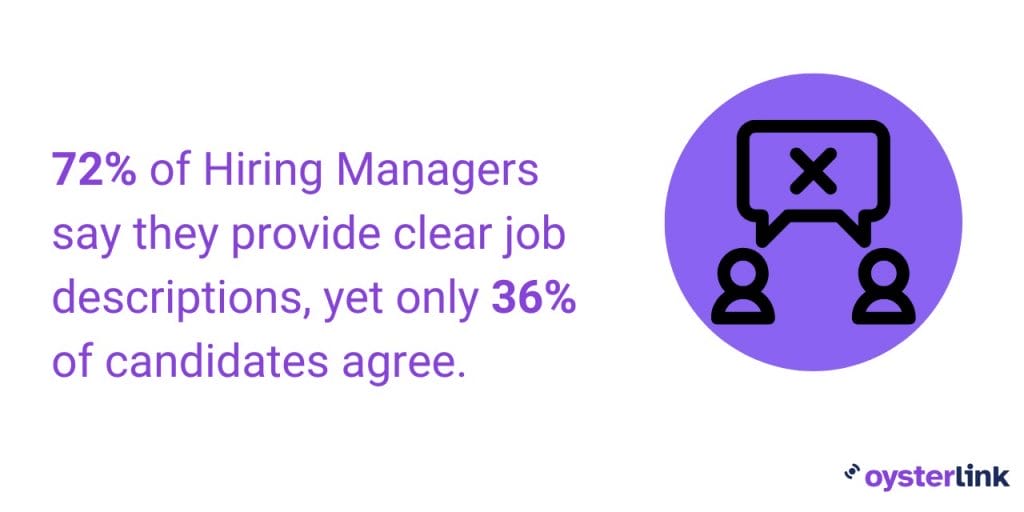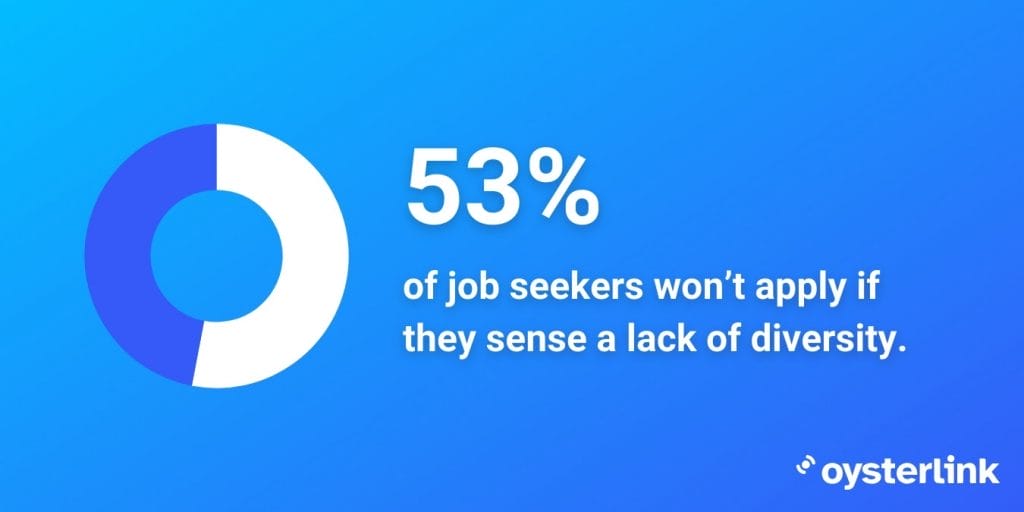Recruitment compliance is important for various reasons, including improving employer branding, building applicant trust and promoting workplace diversity and inclusion.
In addition to enhancing your business reputation, compliance widens your talent pool, increasing your chances of finding qualified candidates.
How To Make Your Job Postings Legally Compliant
Here are key steps to help make your job postings meet legal standards.
Review your job descriptions
Recruitment compliance starts with evaluating your job descriptions for fairness, clarity and helpfulness for both job seekers and current employees.
As you review your job descriptions, consider these questions to ensure they’re legally compliant and effectively communicate important information.
Fairness
- Does your job description focus solely on skills and qualifications related to the job?
- Are there any biased terms or phrases that could discourage certain applicants?
- Does your job description include an equal opportunity statement?
Clarity
- Are you using clear, straightforward language to describe the duties and requirements of the role?
- Is your job description organized logically with headings and bullet points?
- Are technical terms or jargon explained for better understanding?
Helpfulness
- Do you provide practical information, such as working conditions and hours?
- Are there details about training and development opportunities?
- Do you include the salary range, benefits or perks associated with the position, as required by your state’s pay transparency laws?
Make the job description match the job’s roles and responsibilities
A clear job description accurately reflects the role’s responsibilities.
Many businesses assume that their job descriptions match each position’s requirements without considering changes in the job’s scope, organizational needs or industry standards. However, this mindset can be misleading. According to a study, 72% of Hiring Managers say they provide clear job descriptions but only 36% of candidates agree with this.

This significant disconnect can lead to several issues. Candidates may apply for positions with a misunderstanding of what is truly required, resulting in frustration when the actual role doesn’t align with their expectations.
In addition, Hiring Managers may end up interviewing and selecting candidates who don’t possess the skills or experience necessary for the job, leading to increased turnover and wasted resources.
Avoid discriminatory language
Discriminatory language refers to words that are disrespectful toward an individual or a group based on characteristics such as race, religion and age.
Examples of discriminatory language include:
- Gender-specific titles like Salesman, Flight Stewardess and Fireman
- Age-related descriptions such as “young and energetic” may alienate older applicants, while “preference for candidates over 30” may discourage younger job seekers
- Requiring candidates to be “native English speakers” can discourage non-native English speakers who have a high level of proficiency in English
Be careful of disparate impact
Disparate impact, also known as adverse impact, is unintentional discrimination. Specific to recruitment, it can appear as a seemingly neutral job requirement or part of the hiring process
that disproportionately affects a particular group based on characteristics such as race, gender, age or disability.
For example, if your job posting requires Bartender applicants to lift up to 50 pounds, this requirement may unintentionally put women or older individuals at a disadvantage, as they’re generally known to have less upper body strength than men. This could raise concerns about gender discrimination.
However, if you can prove that this requirement is necessary for the role, such as lifting barrels during a shift, you reduce the risk of committing disparate impact.
How is disparate impact different from disparate treatment?
Disparate impact is often discussed alongside disparate treatment or adverse treatment. The difference between the two lies in the intent. Disparate treatment is intentional discrimination.
For example, if an employer explicitly refuses to hire women or older candidates, regardless of their experience and skills, this constitutes disparate treatment.
What are the consequences of committing disparate impact and disparate treatment?
Those found guilty of disparate treatment can face lawsuits, financial penalties and damage to their reputation. For disparate impact, businesses may face investigations and legal repercussions if they cannot demonstrate that their hiring practices or requirements are essential to the role.
Follow State Pay Transparency Laws
Pay transparency laws require businesses to disclose their salary ranges. Colorado was the first state to implement this regulation in 2019, with the goal of reducing wage gaps, especially for women and people of color, who often earn less despite having the same skills and experience as others.
State pay transparency laws vary. For example, in Colorado, Washington and New York, employers must disclose salary ranges in job postings. Meanwhile, in Maryland, Connecticut and Rhode Island, job seekers are entitled to the pay range during the first interview or when they receive a job offer.
Does a company have to post a job opening?
Only companies that provide services to government organizations or are federal contractors are required to post job openings.
Under the Office of Federal Contract Compliance Programs (OFCCP), a U.S. Department of Labor agency ensuring compliance with Equal Employment Opportunity (EEO) laws, these companies must cross-post their jobs to state job banks to ensure that veterans have access to these job openings. State job banks are free job boards managed by state governments.
Companies not offering services to government agencies are free to set their own job posting practices. However, they should maintain consistency to avoid accusations of discrimination, which could expose the organization to legal claims.
Writing a Compliant Job Description When Recruiting
A compliant job description is important for protecting your organization from lawsuits and demonstrating your commitment to equitable hiring practices.
Below are some practical tips to ensure your job descriptions meet compliance standards:
Use inclusive language
Using inclusive language in your job description not only helps you stay compliant but also attracts a wider range of applicants. According to a survey, 53% of job seekers won’t apply for a job if they think an employer lacks diversity.

So, in your job ad, include Diversity, Equity and Inclusion (DEI) statements to highlight your commitment to fostering an inclusive workplace. For example, you might say, “We welcome applicants from all backgrounds and are committed to creating a diverse and inclusive environment.”
However, ensure your inclusivity efforts are genuine. Don’t just include DEI statements for show; implement policies and practices that reflect your commitment.
Focus on key job duties
Only include the core responsibilities of the role. This conciseness keeps you from including skills, qualifications and experience requirements that aren’t relevant to the position, which can lead to discrimination claims.
For example, if you’re hiring a Housekeeper, focus on tasks related to maintaining cleanliness and managing maintenance. By being clear about the duties, you can make sure your requirements make sense for the role such as:
- Ability to follow cleaning protocols and maintain high standards of cleanliness
- Strong attention to detail to ensure all areas are thoroughly cleaned
- Physical stamina to perform repetitive tasks and lift moderate weights, such as linens and cleaning supplies
Straightforward requirements simplify assessing candidates’ qualifications, reducing the likelihood of bias.
Be transparent about physical requirements
Accurately describing the work environment, including physical requirements, allows job seekers to determine if they can fulfill the role’s duties.
For instance, if you’re looking for a Dishwasher, it’s important to specify that the job may require standing for long periods and lifting up to 50 pounds.
Given these physical demands, employers must ensure they can provide reasonable accommodations for applicants with disabilities, as required by the Americans with Disabilities Act (ADA). Including an accommodation statement in the job description can be beneficial.
For example: “We are committed to creating an inclusive environment and are willing to provide reasonable accommodations for qualified individuals with disabilities.” This statement not only informs applicants of their rights but also demonstrates your dedication to inclusivity.
Such accommodations may include offering assistive devices like height-adjustable tables to minimize bending or tools like dish carts to help in transporting heavy items, making tasks easier for those with mobility and strength issues.
Use one of our job description templates
Our job description templates focus on key responsibilities and essential skills relevant to those duties, ensuring conciseness and clarity. This helps you create a job listing in minutes.
By downloading our templates, you can get the bulk of the writing process out of the way and concentrate on legal-related aspects, such as staying updated with compliance laws. This not only streamlines your recruitment process but also enhances your organization’s commitment to fair hiring practices.
Key Compliance Laws and Best Practices in the US
Here are the core compliance laws employers need to follow. Most of these are federal laws except the California Consumer Privacy Act.
Equal Employment Opportunity (EEO) laws
These federal laws enforced by the Equal Employment Opportunity Commission (EEOC) protect workers from discrimination based on age, disability, religious belief, ethnicity and veteran status. EEO laws apply to all stages of hiring, including job postings, interview process and background checks.
Occupational Safety and Health Act (OSHA)
OSHA requires employers to provide a safe and healthy environment for employees. This includes providing them with appropriate personal protective equipment if necessary, safety training and ensuring safe walking-working areas. OSHA also protects workers from retaliation if they report safety concerns.
Immigration and Nationality Act (INA)
INA prohibits employers from discriminating against workers based on race or national origin. This federal law was originally established to eliminate favoritism toward individuals of Northern and Western European descent in securing career opportunities in the U.S. over those from different backgrounds. This law ensures that all qualified individuals, regardless of their racial or national background, have equal access to job opportunities.
Fair Credit Reporting Act (FCRA)
The FCRA protects individuals’ credit information. As part of your hiring process, you may conduct a background check, which can also include a credit check to verify your applicant’s identity, reliability and ability to manage finances, especially if the role involves cash handling. To access credit check information, you need to secure consent from your applicant before obtaining information from the FCRA.
Family and Medical Leave Act (FMLA)
The FMLA protects workers’ rights to take unpaid leave for specific family and health-related reasons without fear of losing their jobs. Eligible employees can take up to 12 weeks of unpaid leave within a year for reasons such as the birth or adoption of a child, serious health conditions or caring for a family member with a serious health condition.
National Labor Relations Act (NLRA)
The NLRA protects employees’ rights to advocate for better wages, working conditions and benefits without fear of retaliation from employers. This law ensures that employees can organize, discuss workplace issues and engage in collective bargaining to improve their work environment.
California Consumer Privacy Act (CCPA)
This state law which was fully implemented in 2020, aims to provide residents with greater control over their personal information. Under the CCPA, residents have data privacy rights, including the right to:
- Limit the use and sharing of their personal information
- Correct any inaccurate information that a business has about them
- Opt out of the sharing of their personal information
- Know how their information will be used

Written by Rea Gierran
With a background in Communication Arts, Rea’s expertise lies in content marketing and copywriting. Her published works can be seen on online news websites such as Rappler and Adobo magazine. Outside of her work, Rea takes on the role of a “momager” for Shiro, a TikTok dogfluencer.

Reviewed by Stefan Petrov
With over 10 years of experience as a writer and editor, Stefan has worked in the automotive, IT, health and hospitality industries. Familiar with Google Search Console and other SEO tools like Ahrefs and Semrush, Stefan uses his experience to create content that’s visually appealing to the user but also ranks in the SERPs.




